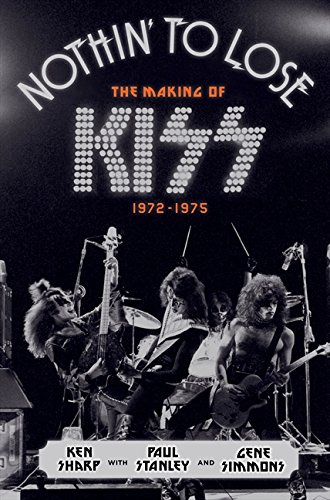‘We were caught up in this idea where
everybody you knew in school was getting up in the morning and working nine to
five, getting married, and having kids, and here we were living on the road,
just being rock-and-roll gypsies.’ Gene Simmons, Nothin' to Lose (p. 250)
I don’t care about Kiss. Did I ever care
about them? I quite like some of their 70s hits, and I liked them when they did
disco. Probably my favourite Kiss record is either ‘I Love it Loud’ or ‘Kiss Army’ by Norman Gunston.
Yet, when I had the chance to borrow the
new Kiss memoir Nothin' to Lose from the
Moreland Library (Coburg branch) I grabbed it, and found it fairly
unputdownable. I have noted the tendency in many of my coworkers to recreate
with literature unconnected to their day job (the orking of cows), usually
thrillers or detective fiction. Well, I have to say, I did interrupt Nothin' to Lose to consume the latest Garry Disher (Bitter
Wash Road, highly recommended). I also took time
out from it to read Mark Opitz’s Sophisto-Punk (which
was interesting, though less compelling).
What is perhaps most impressive about Nothin' to Lose is the incredible cast of interviewees that Ken Sharp (presumably - Stanley and Simmons don't really seem to be much more than key informants) has assembled. Fans, industry insiders, members of other bands some now obscure and others infinitely successful and famous still, photographers, Kiss family members. Even a few people now firmly dead (not sure how that was managed, and I cheatingly looked up some Amazon customer reviews to see the critique made that some of the credited quotes are from other sources with no actual dates applied). (I also noted with interest that the most popular and respected of the Amazon customer reviews was by someone who mused about whether he'd actually bother reading the book or not given the 'sliver' he had viewed).
The interviewees are not only varied and many but they also present variety in their views: not everyone is overwhelmingly positive about Kiss, then or now. Since I have no general view one way or the other (I'm listening to Kiss Alive on youtube as I type this now, and I have to say, I can't see them ever being faves, but of course I am nearly 50 and I've heard a billion things like this before, including I suppose a lot of things that were influenced by Kiss or at least made with knowledge of their work) I'm glad that there's light and shade here. Nonetheless, there is a lot of content clearly designed for the seasoned Kissophile to respond to (in a 'wow, that is so Peter Criss' kind of way). I guess I was really keen on seeing their context; so Kiss emerged around the same time as the New York Dolls and I guess they were generally seen as a poor second runner to that group. Once again, I've never really heard too much NYD (I'm listening to their first album now) and it's better than Kiss but you can sort of see a lot of similarities, particularly the formulaic music (or was the formula only developed since?).
There are a lot of interesting bits and pieces throughout. One bit is the discussion of characters developed on the road: Rush guitarist Alex Lifeson, for instance, worked with Gene Simmons and Ace Frehley to create a figure called 'The Bag': 'I'd wear a paper laundry bag over my head that I drew a face on, and I wore it over a particularly gross costume which was just sweatpants with my arms tucked in the legs coming out the knees'. Peter Criss created a frenchman called 'Monsieur Louie' (p. 303). Other pieces are the degree to which Kiss' manager Bill Aucoin was keeping ahead of creditors in the band's early days, funding tours on his Amex card (is that actually possible? Did Amex cards not have a limit provided you paid it off at the end of every month?). Another is the recruitment and reaction of new fans. Another is - surprise surprise - the terrible attitude to women.
In sum, the book is a pretty triumphalist overview of Kiss' rise to stardom. It does put across a version of the early 70s in the US (the New York '72 period comes out particularly well). It doesn't say why Gene Klein decided to change his last name to Simmons, which you'd have to admit, is an odd thing to do given the fame of the actress Jean Simmons. It also doesn't entirely explain why, given that Paul Stanley and Gene Simmons are plainly pretty down on Ace and Peter, these last two (who haven't been constants in the group at all) were happy to be involved in the book.
There are also a lot of photographs, which don't impress me much but might interest some people. It's not their fault but Kiss were pretty ugly guys when they weren't wearing makeup, but then again, they look pretty ridiculous with makeup too. I don't know if you ever noticed that.





No comments:
Post a Comment